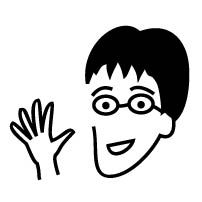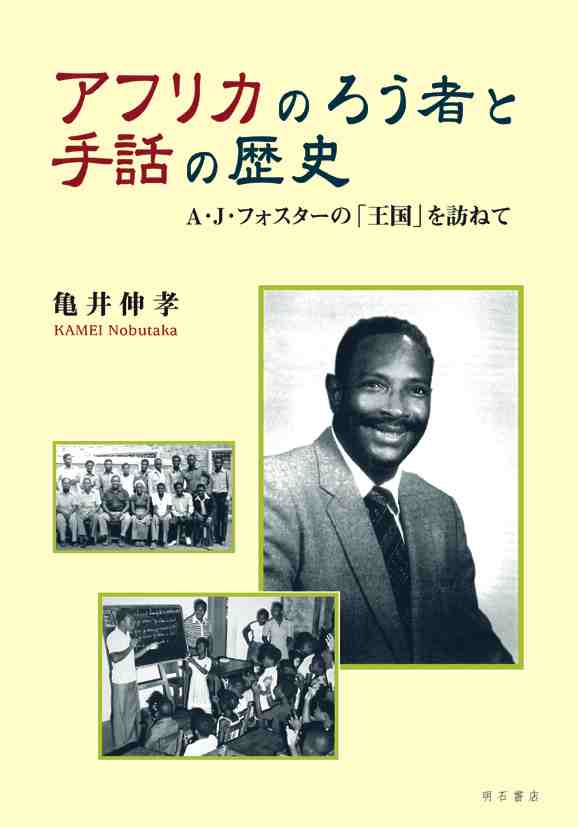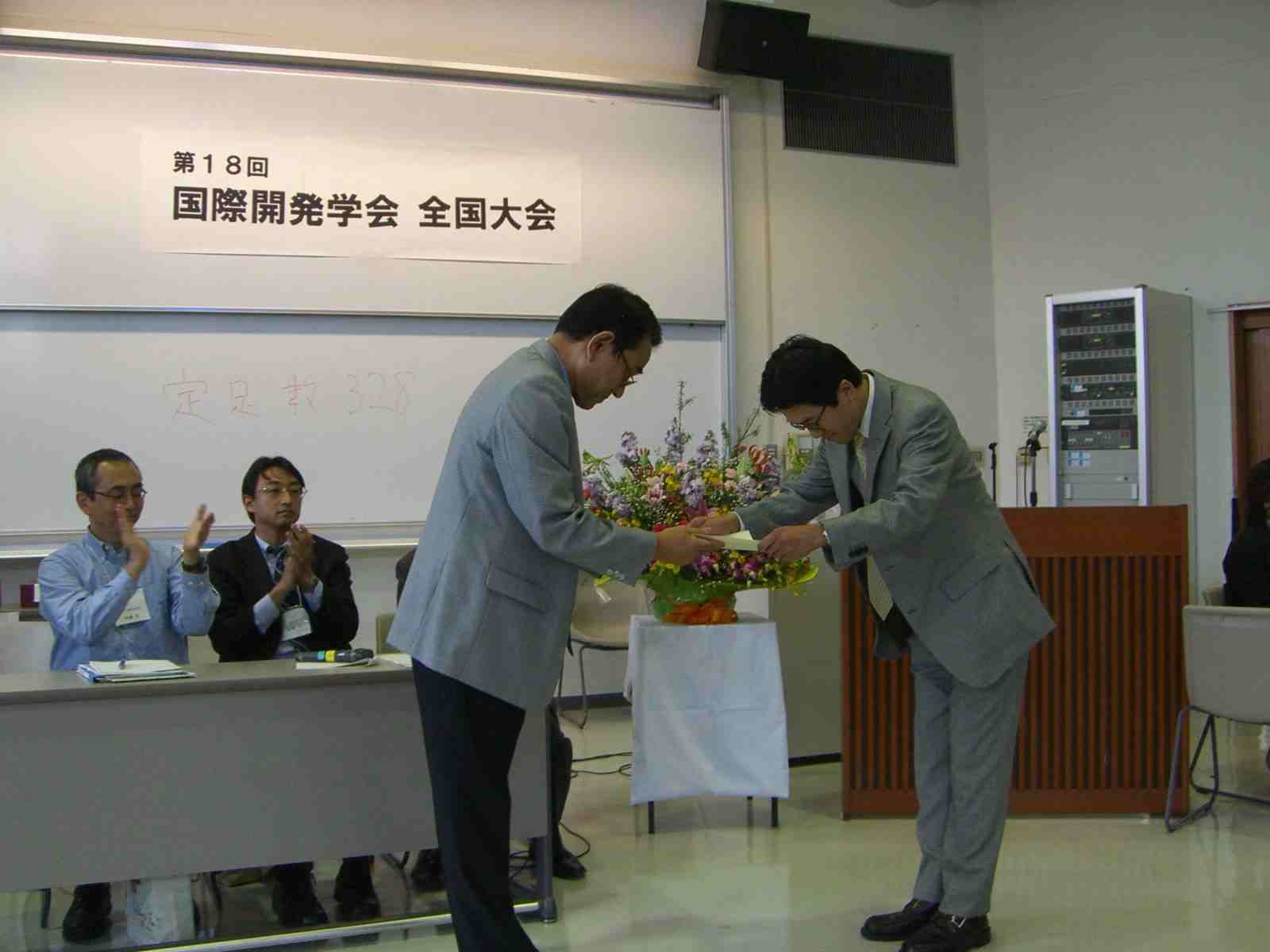KAMEI Nobutaka's Lab |
"History of Deaf people and sign languages in Africa:
|
|
Last updated: August 2, 2008 |
||

There existed the world largest educational system for the Deaf managed by Deaf people themselves in Africa... This book introduces the whole scale of the "education by the Deaf for the Deaf" uniquely achieved in Africa by Dr. Andrew J. Foster, a Deaf African American called "Father of Deaf Education in Africa," and his colleagues. This is also the ethnography of African Deaf communities based on cultural anthropological fieldwork conducted in 5 African countries for 10 years (Ghana, Nigeria, Benin, Cameroon and Gabon). This book was awarded by the Japan International Society for International Development in November 2007 (2007 JASID Award for Excellent Work by Young Researchers). [Dr. Andrew J. Foster (1925-1987)]This book was published by the Grant-In-Aid for Publication of Science (Academic books, field of "Cultural anthropology"), Japan Society for the Promotion of Science, Japan. |
Bibliography and the author
Title: "History of Deaf people and sign languages in Africa: Fieldwork in the "kingdom" derived from Andrew J. Foster"
Author: Nobutaka KAMEI
Publisher: Tokyo: Akashi Shoten Co., Ltd.
Date of publication: December 25th, 2006
Language: Japanese
Size: A5 / 256 pages
Price: 2,800 Yen and tax
ISBN978-4-7503-2470-8
Author: Nobutaka KAMEI, Dr.
Born in Kanagawa Prefecture, Japan in 1971. Doctor in Science, Kyoto University. Major in anthropology and African area studies. COE Associate Professor of Kwansei Gakuin University, Japan. He has been conducting fieldwork in 5 African countries since 1996.Main publications:
Akiyama, Nami & Nobutaka Kamei. 2004. Shall we sign? (Shuwa de ikou). Kyoto: Minerva Shobo.
Kamei, Nobutaka. 2005. Play among Baka children in Cameroon. In: Hewlett, Barry S. and Michael E. Lamb eds. Hunter-gatherer childhoods: Evolutionary, developmental & cultural perspectives. New Brunswick, NJ: Transaction Publishers. 343-359.
Kamei, Nobutaka. 2004. The sign languages of Africa. In: Journal of African Studies (Africa Kenkyu) (Japan Association for African Studies) 64 (March 2004): 43-64.
Kamei, Nobutaka. 2006. Language and well-being: Three basic essentials of linguistic rights. In: Kosaka, Kenji ed. A sociology of happiness: Japanese perspectives. Melbourne: Trans Pacific Press. 99-117.
[Curriculum vitae]
[List of publications]
[Fieldwork]
(Data on the date of publication [December 2006])
Links
Akashi Shoten Co., Ltd. (publisher) (in Japanese)
Amazon.co.jp (in Japanese)
Christian Mission for the Deaf (in English)

Award "History of Deaf people and sign languages in Africa: Fieldwork in the "kingdom" derived from Andrew J. Foster" was awarded by JASID, the Japan International Society for International Development (2007 JASID Award for Excellent Work by Young Researchers). The award ceremony was held on November 24, 2007 in the General Meeting of JASID (Okinawa University, Naha, Okinawa). |
Book reviews
"History of Deaf people and sign languages in Africa: Fieldwork in the "kingdom" derived from Andrew J. Foster" was introduced in the following newspapers, journals and magazines.Journal of Disability Studies (Shogaigaku Kenkyu) (Japan Society for Disability Studies) 3 (2007): 191-200.
Journal of African Studies (Africa Kenkyu) (Japan Association for African Studies) 71 (Dec. 2007): 151-152.
Japanese Sociological Review (Shakaigaku Hyoron) (Japan Sociological Society) 58(3) (Dec. 2007): 386-387.
Africa Report (Institute of Developing Economies) 45 (Sep. 2007):56.
Africa (The Africa Society of Japan) 47(4)(Jul.-Aug. 2007):38.
Monthly Gengo (Language) (Taishukan) 36(6) (Jun. 2007):116.
Equal 72 (Apr. 2007):43.
Japanese Deaf News (Japanese Federation of the Deaf) 687 (Mar. 15, 2007):6.
Mainichi Shimbun (Newspaper) Morning, Feb. 18, 2007:11.
Contents
"History of Deaf people and sign languages in Africa: Fieldwork in the "kingdom" derived from Andrew J. Foster"
By Nobutaka KAMEI, 2006, Tokyo: Akashi Shoten Co., Ltd., in Japanese.Preface
Explanatory notes
Chapter 1. Deaf people and sign languages in Africa
1-1. The Deaf world in Africa
Deaf Africans as the subaltern / Deaf people and sign languages / Deaf communities and Deaf culture / From the oppression to the revaluation of sign languages: Modern history of the Deaf / Africa, the homeland of the human being / Africa, the multilingual continent / A million of Deaf people in Africa / Deaf organizations in 37 African countries1-2. Sign languages in Africa
Creating a sign language map of Africa / Sign languages which are already named / Sign languages which are not named yet / Characteristics of African sign languages1-3. Foreign sign languages introduced into Africa
Foreign sign languages in 27 African countries / Characteristics of foreign sign languages / Slight influence by the former colonizers of Africa1-4. Three questions on American Sign Language
Why has ASL been distributed and why especially in French-speaking Africa? / Why are the oppositions against ASL rarely found? / In search of the footprints of an American named Foster1-5. Fieldwork into Deaf communities
Circum-Nigerian research project / Fieldwork in sign languageChapter 2. Foster, Father of Deaf education in Africa
2-1. Andrew Foster, the hero of the Deaf
The pioneer of the Black Deaf community2-2. Life of Andrew Foster
Boyhood under the segregated Deaf education / The first Black graduate from Gallaudet Collage / Dream of missionary activities in Africa / Fly to Africa alone / Honor and the expansion of the mission / Tragic sudden death and afterwards2-3. Half life of Berta Foster
From Germany, the country of oralism, to Africa / Hand in hand with Andrew2-4. Multiple images of Foster
Two aspects of the hero / Toward a new image of FosterChapter 3. Half century of the mission of the Deaf
3-1. World largest educational system
"From not so dark continent" / 32 deaf schools in 13 countries / Projects in Latin America that have not been actualized / Other activities in addition to school education / Foster flew all over the world3-2. Three periods of CMD
Number of deaf schools: Sustaining periods and an expanding period / The 1st period: Education in 2 English-speaking countries (1957-1974) / The 2nd period: Expansion in 11 French-speaking countries (1974-1987) / The 3rd period: Diminution of the scale and sustainable activities (1987-today)3-3. Total communication of Foster
Foster's pedagogical philosophy / Situations in the classrooms / Literacy of English and French / Introduction of American Sign Language / Impacts given by schools of sign language education3-4. Teacher training by the Deaf
Deaf colleagues who supported CMD expansion / Christian Center in Nigeria / Teacher training with international trainees / Priority policy to invite Deaf persons / Instructions by Deaf Beninese3-5. Ibadan, the capital of the Deaf
Memories of the day in Ibadan / Hearing trainees among signing colleagues / Life history of a Deaf trainee / Factors of the success of the teacher training / Ibadan, the capital of the Deaf / Foster, the great coordinatorChapter 4. Heritages of Foster
4-1. Foster's death and the turning point of the mission
Foster's sudden death in Rwanda / Difficulties in each Deaf community4-2. Foster's colleagues of today
Passion to the Christianity: Ghana / Return to the local deaf education: Nigeria / Continuing the international activities: Benin / Dreams achieved by Foster's colleagues: Cameroon / Introduction of the oralism and struggles: Gabon / Expansion of deaf schools4-3. Birth of Franco-African Sign Language
ASL in French-speaking Africa / Vocabulary of ASL and its changes / Finger spelling of ASL and its changes / Compounds and word order / African indigenous signs / Dissociation and diverge from ASL / Language consciousness of the signers4-4. Deaf churches
Religion as a purpose, religion as a method / Churches run by signing communities4-5. Legends on Foster: History within signing communities
"Foster," the most useful keyword / Foster's legends transmitted among the Deaf / "Comme Foster (like Foster)"Chapter 5. What we can learn from the achievements of the Deaf
5-1. Why did CMD succeed?
Congress of Milan and the Congress of Berlin / Africa, the vacuum continent of oralism / Hearing aids in Africa / Origins of Foster's philosophy / Advanced aspects of CMD and criticism5-2. Shift of Deaf images: For the aspect of cultural anthropology
3 types of Deaf images / The 4th model: Deaf communities on the move5-3. Effect of signing communities: For the aspect of the deaf education
Basic strategy of CMD / "It seems to be hard in France" / Affirmative actions for deaf education5-4. Empowerment and linguistic liberty: For the aspect of development policies
Liberty and capabilities of the Deaf / Tasks which CMD has not achieved / Liberty of sign languages in the development5-5. Through the endless linguistic disputes: Clarifying the historical rules
Linguistic disputes and historical rules / Suggestions for the peaceful coexistence5-6. Conclusion
Three answers[Columns] Deaf community data files
(1) Republic of Ghana: "Birth place of deaf education in West Africa"
(2) Federal Republic of Nigeria: "Foster's colleagues who influenced over Federal government's policy"
(3) Republic of Benin: "Groups of instructors who supported the CMD expansions"
(4) Republic of Cameroon: "Issues in the bilingual country of English and French"
(5) Gabonese Republic: "Struggles against oralization in the late 20th century"
Notes
Afterward: Writing the history of the "Kingdom of the Deaf in Africa"
[Appendix]
(1) "Social aspects of Deafness: School years," keynote speech of the 7th World Congress of the Deaf (July 31, 1975, Washington DC, USA by Andrew J. Foster / Translated into Japanese by Nobutaka KAMEI)(2) Foster's pedagogical philosophy: Analysis of Foster's keynote speech (Nobutaka KAMEI)
(3) Mini encyclopedia of languages, cultures and history of Deaf Africans
(4) Chronology
(5) List of deaf schools and Christian centers for the Deaf founded by CMD
References
Index (key persons / places / keywords / languages)
List of languages in this book (From the Index)
[Sign languages in North Africa]
Egypt Sign Language / Libyan Sign Language / Tunisian Sign Language / Algerian Sign Language / Moroccan Sign Language[Sign languages in West Africa]
Bamako Sign Language / Gambian Sign Language / Guinean Sign Language / Sierra Leone Sign Language / Ghanaian Sign Language / Adamorobe Sign Language / Nigerian Sign Language / Hausa Sign Language[Sign languages in Central Africa]
Chadian Sign Language / Congolese Sign Language / Franco-African Sign Language [Langue des Signes Franco-Africaine: LSFA][Sign languages in East Africa]
Ethiopian Sign Language / Kenyan Sign Language / Ugandan Sign Language / Tanzanian Sign Language[Sign languages in Southern Africa]
Zambian Sign Language / Zimbabwe Sign Language / Mozambican Sign Language / Namibian Sign Language / South African Sign Language / Madagascar Sign Language[Sign languages in Asia]
Japanese Sign Language / Korean Sign Language[Sign languages in North America]
American Sign Language [ASL] / Quebec Sign Language [Langue des Signes Québécoise: LSQ][Sign languages in Western Europe]
French Sign Language [Langue des Signes Française: LSF] / British Sign Language [BSL] / German Sign Language / Belgian Sign Language / Dutch Sign Language / Irish Sign Language[Sign languages in Nordic countries]
Swedish Sign Language / Finnish Sign Language / Danish Sign Language / Norwegian Sign Language[Spoken languages]
English / French / Japanese / Spanish / Portuguese / European languages in Africa / Lingua francas in Africa / Ethnic languages in Africa
 To the top of this page
To the top of this page